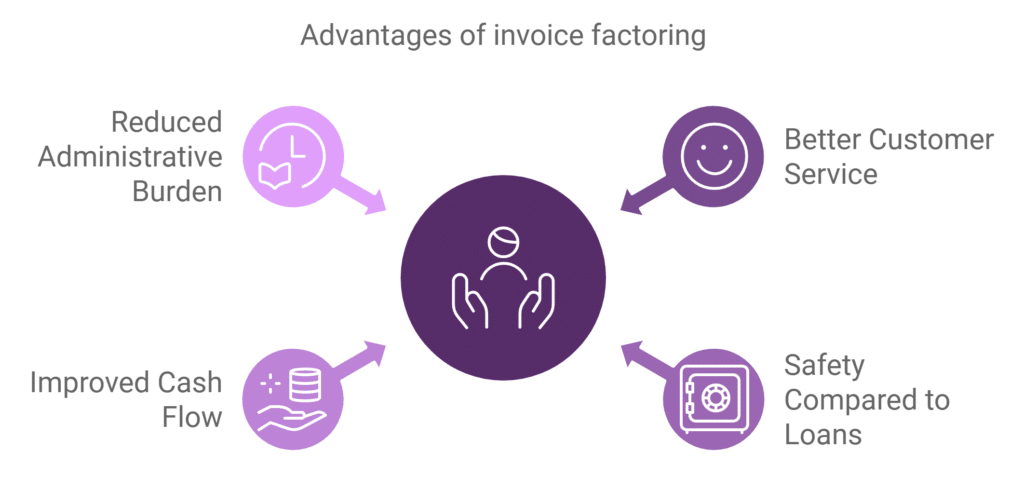What is invoice factoring?
Invoice factoring is a practice when a business sells its unpaid invoices to a third party, known as a factoring company. This is done because the factoring company gives a large percentage of the value of unpaid invoices to the business immediately, which results in an instant cash inflow. In return, it receives a factoring fee which is also known as the discount rate.
But the catch here is that the factoring company then gains full control of the invoices, which means it will be the factoring company who will be responsible for collecting payments from the customers of the business, not you.
According to a report by Invoice Funding, the market size of the invoice finance industry in the UK stands at £3.0bn in 2024.
How does invoice factoring work?

- Selling invoices: A business with outstanding invoices chooses to sell them to a factoring company. This is typically done to immediately access cash rather than waiting for customers to pay their invoices, which might take 30, 60 or even 90 days.
- Advance payment: An advance payment of 70% to 90% is forwarded to the business by the factoring company once the invoices have been submitted. The advance amount is decided by the factoring company based on criteria such as creditworthiness, invoice age and the nature of the business.
- Factoring company collects payments: The factoring company then assumes responsibility for collecting payments from the business’s customers. Customers are told that their payment should now be routed to the factoring company rather than the original business.
- Final payment: Once the factoring company gets paid for entirely by the customers, it pays the business the remaining invoice value minus a fee for services. The fee is typically 1% to 5% of the invoice value.
Compare Invoice Financing Quotes Today
Invoice factoring example
Suppose a manufacturing company A has sold products worth £50,000 to a client, but the client has 60 days to pay. Company A decides to employ the invoice factoring service.
The factoring company provides 80% of the invoice value and charges 3% as a fee. The calculations are as follows:
Amount forwarded by the factoring company = 80% x £50,000 = £40,000
Factoring fee = 3% x £50,000 = £1500
Remaining balance paid to the business = £8,500
Total money received by the business = £50,000 – £1500 = £48,500
According to a report of UK Finance in 2017, businesses that got funded by invoice finance saw a 38% increase in their yearly sales.
How to decide if factoring is worth it for your business?
The decision about whether invoice factoring is a good idea will be clear once you learn about its advantages and disadvantages. So, let’s have a look.
Advantages of invoice factoring:
- Better customer service: Since the factoring company provides a business like yours with immediate cash flow, you can offer flexible payments to your customers. This involves giving them the freedom of 30–90 days to make the payment. Also, since now the factoring company is responsible for collecting the payments and not you, you can focus on improving parts of your customer service, like chat systems.
- Safer than loans: When you get loans from a bank, it requires you to assign collateral, and the inability to pay on time may affect the credit rating. That’s not the case with invoice factoring.
- Improves the cash flow: A restricted cash flow can hamper your business, e.g. you’ll face difficulty meeting the payroll. With factoring, however, you get instant cash flow which keeps the operations running.
- Frees you from administrative burden: Since the factoring company takes the responsibility of collecting payments from your customers, it reduces the credit management burden of your business. You can then focus on other important elements of your business.

Disadvantages of invoice factoring:
- Reduces profit: Businesses have to bear the factoring fee which results in giving away a part of their profit. In some cases, it can be as high as 5% which gets even more expensive than traditional loans.
- Negative customer experience: Let’s be honest about it. The involvement of a third-party company in the payment process negatively affects customer perception. They may think the business is unstable and cash flow negative, which can reduce their trust.
- Loss of control: Businesses give up control over the collection process. This may affect the customer relationship as well.
Factors affecting invoice factoring costs

One important consideration to determine if invoice factoring is worth it is its cost to the business. It is determined by various factors.
- Invoice size and volume: The larger and more frequent your invoices, the more negotiating power you have, which can potentially reduce the factoring fee. High-volume invoicing often leads to lower rates because it offers a steady stream of revenue to the factoring company.
- Payment terms offered to customers: The length of time your customers have to pay their invoices significantly impacts the cost. Longer payments increase the risk for the factoring company, leading to higher fees. Shorter payment terms generally result in lower costs.
- Credit history of your customers: Factoring companies evaluate your customers’ creditworthiness. If they have a good credit history, the risk to the factoring company is reduced, which can result in cheaper costs.
- Industry type: Certain businesses are viewed as more risky owing to the nature of their operations or the dependability of their customers. The higher the value of risk, the higher the factoring rates.
- Factoring type: The choice between recourse and non-recourse factoring also influences the cost. Non-recourse factoring, in which the factoring company accepts the risk of nonpayment, often carries greater costs than recourse factoring, in which the business maintains the risk.
Now that we are on this topic, let’s quickly discuss the costs associated with factoring as well. The main cost is the factoring fee, which can vary between 1% – 5% and even 8% in some cases. Other fees include late invoice fees (in the case of recourse factoring), collection service charges and annual fees.
Please note that these additional fees vary according to the country, business and type of factoring company.
How to choose the right factoring company?
Selecting the right factoring company is crucial for ensuring that factoring finance is a cost-effective and beneficial solution for your business. Here’s how to choose one:
- Understand the cost structure: Fee structures vary amongst factoring companies, including discount rates, service charges and extra charges for items such as wire transfers. Review these costs to ensure they are within your budget. Look for a company that is transparent in its fee structure.
- Evaluate funding speed: Some factoring companies offer same-day funding while others may require a few days. Depending on your cash flow, select the one that can provide funds rapidly enough to sustain your operations.
- Access industry experience: Factoring companies may specialise in certain sectors. Working with a company that knows your sector will be beneficial since they will better grasp your business difficulties and provide specialised solutions.
- Check customer service quality: Look for prompt and supportive customer service. Choose a factoring company that provides simple access to account managers and support team.
- Consider credit control services: Some factoring companies provide extra services such as credit card checks for your customers and debt collection. If your business can benefit from these services, look for a company that offers them as part of the package.
All in all, invoice factoring is totally worth it if you want a regular cash flow and are ready to dedicate a fixed percentage of your profit to the factoring company.
ComparedBusiness links you with top factoring companies in the UK
Want reliable invoice factoring services for your business in the UK? ComparedBusiness helps you with it by linking you with the top invoice factoring companies in the UK. Just submit your requirements in less than 2 minutes and we will get back to you with suitable matches. You can choose the best option depending on your business needs.
